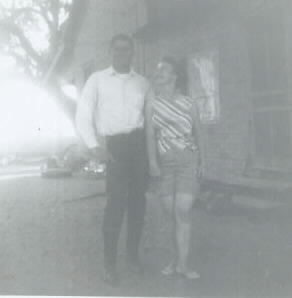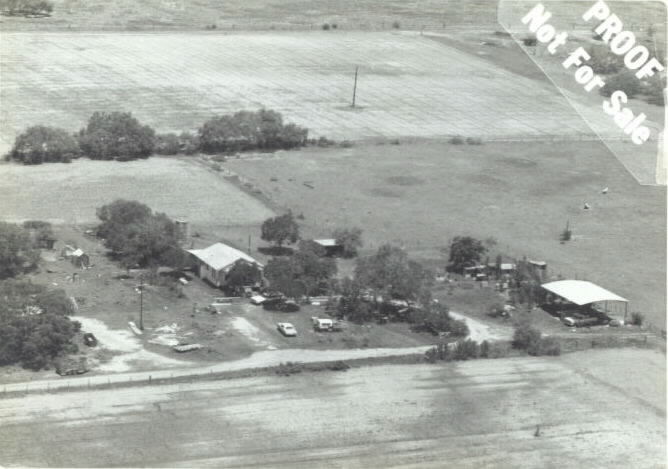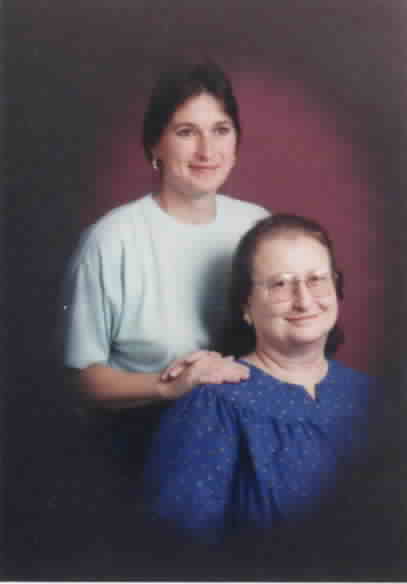Dorothy Mutz (nee Hartman)


My grandmother, Dorothy Mutz was born on August 8, 1938 to Elmore and Adella Hartman. She was born seven miles outside of Floresville in a little house that had dirt floors and feed sacks covering the windows. The house was located on a little farm that was owned by a person that my grandmotherís father sharecropped for. Her father had to give the owner one fourth of crops that he harvested. Dorothy later moved to a farm closer to Floresville, this is where she spent most of her life. Dorothy has eight siblings; she has two brothers and six sisters. While she was growing up she had to take care of all of the children because she was the oldest. She said that by the time she was 14 she could fix a full course meal and butcher a chicken by herself. Whenever she had time she attended school. The only times that she could go to school was when she didnít have to help her dad farm or when she didnít have to take care of the children. Dorothy got married to my grandpa, Fabian Mutz Sr. on January 28, 1956 when she was 17. When they got married they moved to a little farm in LaVernia and now she currently lives in Floresville. Dorothy's first job was a waitress and she could not get that job until she was married. One thing she said that she does not see anymore is a stationary peanut thresher. This thresher was used by the whole community and everyone helped each other so that everyone could harvest their peanuts. She said this is the time when people where not afraid to help each other. This is one thing that she said that she wished that she still saw.

How did your family depend on agriculture?
My grandparents from mother's side were farmers and my father started farming from a very young age and farmed until he passed away.
Where there a lot of families in the area that depended on agriculture?
All the families in the community were farmers and ranchers and everybody helped each other out.
Did your father like being a farmer?
Yes he did.
Did you ever have to go out and work in the fields?
No not until I got married. My father raised nine children on the farm.
How big where the fields that your family harvested?
From four to 500 acres.
How long did it take your family to harvest the fields?
Three days or more, depended on the weather, or what type of crops, peanuts usually took longer.
Did people come and help your family with the crops?
Yes, neighbors helped neighbors.
Did your family ever go and help other families with their crops?
Yes, families would take turns harvesting their crops. Other families would come and help us and we then helped them.
How did your family get the crops to town?
By truck and trailer or wagon.
Where did your family take their crops to weigh them?
To the mill in Floresville, Donaho, Talley and then I did not know.
Who did your family sell the crops to?
They had people from factories who came by, and they contracted the crops to them.
Did your family do sharecropping?
Father and mother sharecropped the first three years of their marriage.
What percentage of the crops did your family have to give to the owner of the land?
They took the expenses out then they divided the rest equally.
Did it take your family a long time to pay off the family farm?
No, and then he bought another place because he hit it big on peas.

What was the biggest crop in Floresville?
Peanuts, they where what Floresville became known for.
Did the whole family have to work together?
Yes we had to feed the cows and chickens and do everything.
What was the woman's role on the farm?
Take care of the children, laundry, housework, and sometimes feeding the animals.
Did you all sometimes have to work in the fields with the crops?
No, did not do that until I got married and I helped my husband haul hay, and I helped my father to thresh peanuts, and I sacked them.
What did the women do on harvest days?
The women would fix the lunches and take them to the fields for the men. Sometimes we would make big trays of bologna and make sandwiches, and we would fill quart jars with coffee and we would take it out to the fields for the men to eat. This would be for dinner and afternoon lunch. You have to realize that their days started at daybreak and they at lunch at 11 o'clock and they ate the second lunch at three-thirty. They would eat again, and then work until dark. Th
What did the other farmer's wives do?
The owner of the place's wife would fix the lunch and then when the harvesting was at someones else's house, their wife would fix the food.
What did the children do?
They followed their mothers. One time I could remember that we would chase lizards and the lizard ran into a pile of peanuts and we ran into a rattlesnake.
Do you miss doing all of that stuff?
Back then people helped each other, everybody cared about each other and everyone knew what was going on in each other's lives. Today nobody is willing to help each other. They just care about themselves.
How did the woman's role change over the years?
Women were not involved, after years went by women stayed at home or they worked in town.
So the women really did not work outside?
When the people were together, each one had their own responsibilities. Women usually took care of the chickens, and butchered them. Sometimes the women would do the feeding of the livestock, and then the women had to take care of the children and they had to do laundry and sew clothes and other work around the house.
Would you say that you have it easier now or back then?
Oh it is easier now, back then on Sundays we would eat fried chicken and we would have to chase them down until they got so tired that we could catch them. We would then have to pluck them and then chop them up and then fry them.

Peanuts. This website tells the history of peanuts in Floresville. It also tells related cites and other topics dealing with Floresville, and peanuts. 2003.
Floresville This website tells the history of Floresville, Texas. From The Handbook of Texas On Line. The Handbook of Texas Online is a joint project of The General Libraries at the University of Texas at Austin and the Texas State Historical Association. 2002.
LaVernia This website tells the history of LaVernia, Texas. From The Handbook of Texas On Line. The Handbook of Texas Online is a joint project of The General Libraries at the University of Texas at Austin and the Texas State Historical Association. 2002.
Sharecropping This website talks about sharecropping and how it has changed over the years. From the article The New Deal for Share-croppers, from The Nation, Amberson, William R. 1934
Agriculture This website talks about farming in Wilson county, it shows a map of wilson county, and it shows how many farms there are. The sits shows interesting facts about wilson county and the peope that live there. From The Handbook of Texas On Line. The Handbook of Texas Online is a joint project of The General Libraries at the University of Texas at Austin and the Texas State Historical Association. 2002.